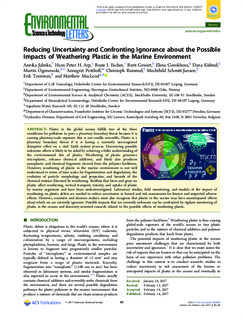Reducing Uncertainty and Confronting Ignorance about the Possible Impacts of Weathering Plastic in the Marine Environment
Jahnke, Annika; Arp, Hans Petter Heinrich; Escher, Beate I.; Gewert, Berit; Gorokhova, Elena; Kühnel, Dana; Ogonowski, Martin; Potthof, Annegret; Rummel, Christophe Daniel; Schmitt-Jansen, Mechtild; Toorman, Erik; MacLeod, Matthew
Peer reviewed, Journal article
Permanent lenke
http://hdl.handle.net/11250/2446787Utgivelsesdato
2017Metadata
Vis full innførselSamlinger
- NGI articles [1037]
Originalversjon
Environmental Science and Technology. 2017, 4 (3), 85-90. 10.1021/acs.estlett.7b00008Sammendrag
Plastic in the global oceans fulfills two of the three conditions for pollution to pose a planetary boundary threat because it is causing planetary-scale exposure that is not readily reversible. Plastic is a planetary boundary threat if it is having a currently unrecognized disruptive effect on a vital Earth system process. Discovering possible unknown effects is likely to be aided by achieving a fuller understanding of the environmental fate of plastic. Weathering of plastic generates microplastic, releases chemical additives, and likely also produces nanoplastic and chemical fragments cleaved from the polymer backbone. However, weathering of plastic in the marine environment is not well understood in terms of time scales for fragmentation and degradation, the evolution of particle morphology and properties, and hazards of the chemical mixture liberated by weathering. Biofilms that form and grow on plastic affect weathering, vertical transport, toxicity, and uptake of plastic by marine organisms and have been underinvestigated. Laboratory studies, field monitoring, and models of the impact of weathering on plastic debris are needed to reduce uncertainty in hazard and risk assessments for known and suspected adverse effects. However, scientists and decision makers must also recognize that plastic in the oceans may have unanticipated effects about which we are currently ignorant. Possible impacts that are currently unknown can be confronted by vigilant monitoring of plastic in the oceans and discovery-oriented research related to the possible effects of weathering plastic.
